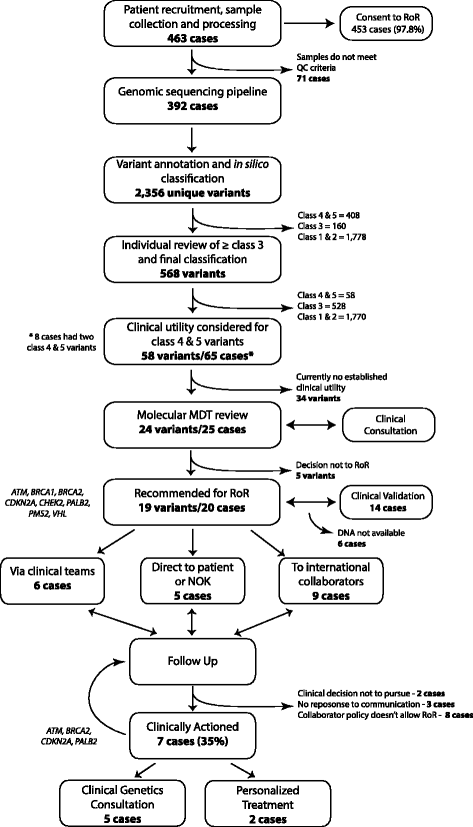Lost in translation: returning germline genetic results in genome-scale cancer research
- PMID: 28454591
- PMCID: PMC5408494
- DOI: 10.1186/s13073-017-0430-4
Lost in translation: returning germline genetic results in genome-scale cancer research
Abstract
Background: The return of research results (RoR) remains a complex and well-debated issue. Despite the debate, actual data related to the experience of giving individual results back, and the impact these results may have on clinical care and health outcomes, is sorely lacking. Through the work of the Australian Pancreatic Cancer Genome Initiative (APGI) we: (1) delineate the pathway back to the patient where actionable research data were identified; and (2) report the clinical utilisation of individual results returned. Using this experience, we discuss barriers and opportunities associated with a comprehensive process of RoR in large-scale genomic research that may be useful for others developing their own policies.
Methods: We performed whole-genome (n = 184) and exome (n = 208) sequencing of matched tumour-normal DNA pairs from 392 patients with sporadic pancreatic cancer (PC) as part of the APGI. We identified pathogenic germline mutations in candidate genes (n = 130) with established predisposition to PC or medium-high penetrance genes with well-defined cancer associated syndromes or phenotypes. Variants from candidate genes were annotated and classified according to international guidelines. Variants were considered actionable if clinical utility was established, with regard to prevention, diagnosis, prognostication and/or therapy.
Results: A total of 48,904 germline variants were identified, with 2356 unique variants undergoing annotation and in silico classification. Twenty cases were deemed actionable and were returned via previously described RoR framework, representing an actionable finding rate of 5.1%. Overall, 1.78% of our cohort experienced clinical benefit from RoR.
Conclusion: Returning research results within the context of large-scale genomics research is a labour-intensive, highly variable, complex operation. Results that warrant action are not infrequent, but the prevalence of those who experience a clinical difference as a result of returning individual results is currently low.
Keywords: Genomic data; Research ethics; Return of results; Whole-genome sequencing.
References
Publication types
MeSH terms
Grants and funding
LinkOut - more resources
Full Text Sources
Other Literature Sources
Medical


